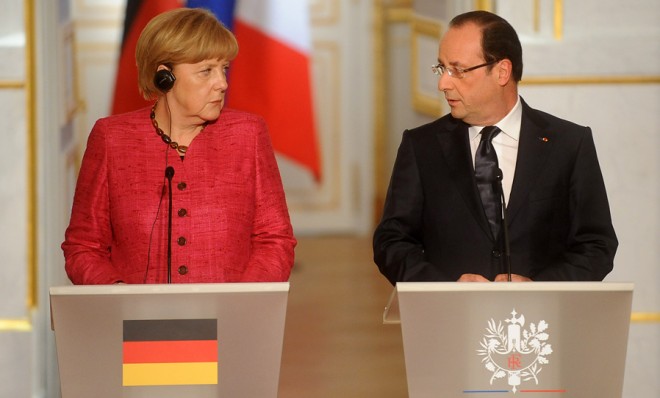Could U.S. spying ruin a $127 billion trade deal with the EU?
France is threatening to derail a massive pact over the NSA's alleged snooping

A free daily email with the biggest news stories of the day – and the best features from TheWeek.com
You are now subscribed
Your newsletter sign-up was successful
Recent allegations that the NSA spied on European Union offices in the United States and Belgium could threaten a massive trans-Atlantic trade deal worth hundreds of billions of dollars.
France is leading the opposition, arguing that negotiations between Washington and the EU should be stalled for 15 days in light of the information leaked by NSA whistleblower Edward Snowden. The money at stake: $127 billion in additional output for the United States and $159 billion for the EU, according to an EU-commissioned study of the Transatlantic Trade and Investment Partnership (TTIP).
"We cannot accept this kind of behavior between partners and allies. We ask that this immediately stop," said French President François Hollande. "There can be no negotiations or transactions in all areas until we have obtained these guarantees, for France but also for all of the European Union, for all partners of the United States."
The Week
Escape your echo chamber. Get the facts behind the news, plus analysis from multiple perspectives.

Sign up for The Week's Free Newsletters
From our morning news briefing to a weekly Good News Newsletter, get the best of The Week delivered directly to your inbox.
From our morning news briefing to a weekly Good News Newsletter, get the best of The Week delivered directly to your inbox.
Matthew Yglesias of Slate breaks down just how significant TTIP is:
TTIP would be the biggest trade pact of all time, by far. It creates a trading bloc far larger than NAFTA — extending from California to Romania, and encompassing almost half the world's total economic output. It would reach much deeper "behind the border" into public policy areas people don't think of as pertaining to trade. The $2.8 trillion of GDP generated by our NAFTA partners Mexico and Canada is swamped by the European Union's $16 trillion economy. [Slate]
Could France really scuttle a deal worth so much money to so many countries?
It would have to convince the other 27 EU member states that stalling negotiations is in their best interests. That's not such an easy task.
Germany, which, according to Der Spiegel, was targeted by the NSA more than any other EU nation, hasn't been afraid of criticizing the NSA's actions. Still, Germany won't back out of trade talks, said a spokesman for German Chancellor Angela Merkel's government.
A free daily email with the biggest news stories of the day – and the best features from TheWeek.com
And France's complaints have struck some observers as being a little rich. "Governments on both sides of the Atlantic (and almost everywhere else) have spied on allies and enemies alike for a long time," says The New York Times in an editorial, which tweaked France, Germany, and other supposedly outraged parties for "playacting."
While EU officials have expressed concern that the NSA's inside information will give Washington a significant advantage at the bargaining table, negotiations are expected to start on July 8 as planned.
The NSA's snooping isn't the only thing that could derail TTIP. France's ruling Socialist Party has already expressed misgivings about the free trade pact, particularly on regards to French cultural and film subsidies. The United States and the EU are also expected to tussle over genetically modified U.S. agriculture.
Indeed, France may simply be trying to gain leverage in talks over a trade pact it's not even sure it wants. Bill Reinsch, president of the National Foreign Trade Council, tells The Hill that the NSA allegations "gives people who don't want it more ammunition."
Keith Wagstaff is a staff writer at TheWeek.com covering politics and current events. He has previously written for such publications as TIME, Details, VICE, and the Village Voice.
-
 6 of the world’s most accessible destinations
6 of the world’s most accessible destinationsThe Week Recommends Experience all of Berlin, Singapore and Sydney
-
 How the FCC’s ‘equal time’ rule works
How the FCC’s ‘equal time’ rule worksIn the Spotlight The law is at the heart of the Colbert-CBS conflict
-
 What is the endgame in the DHS shutdown?
What is the endgame in the DHS shutdown?Today’s Big Question Democrats want to rein in ICE’s immigration crackdown